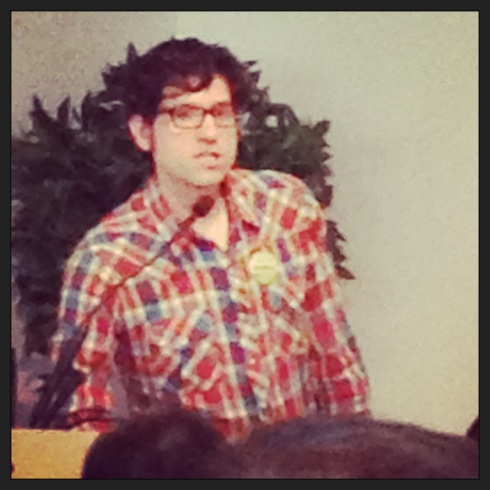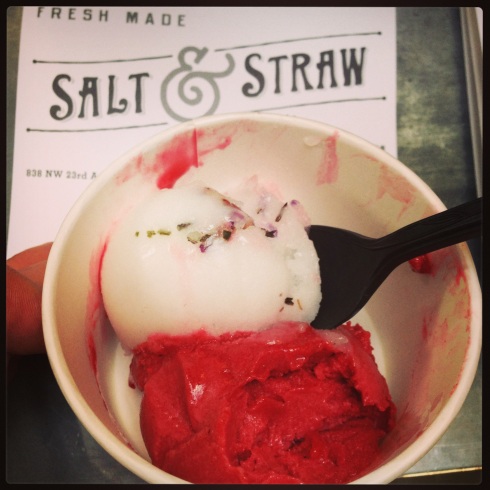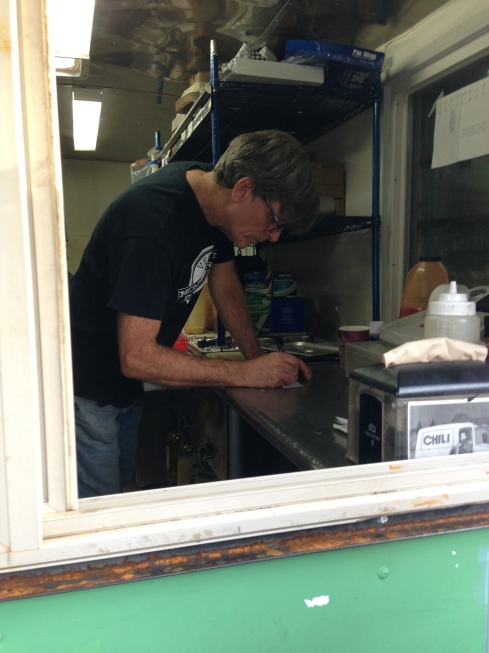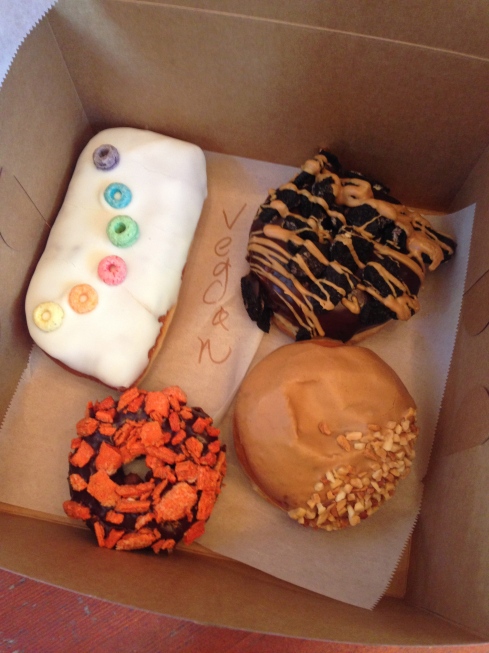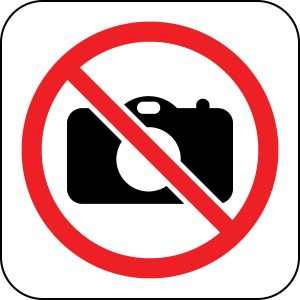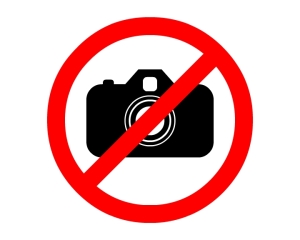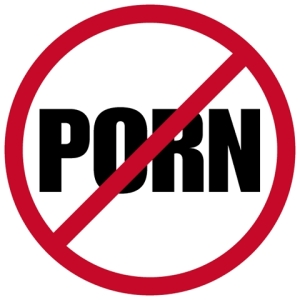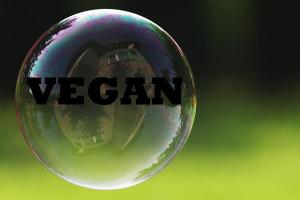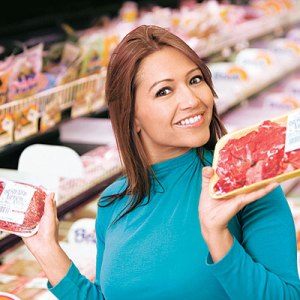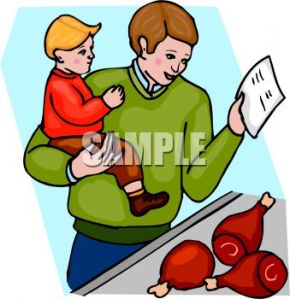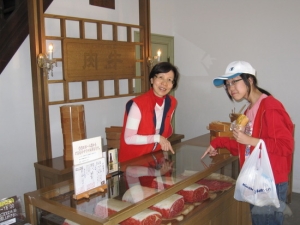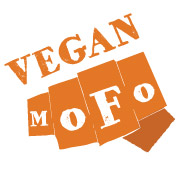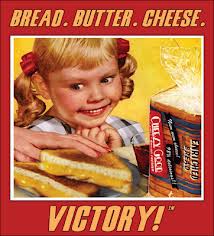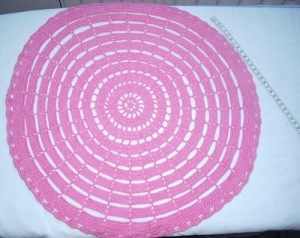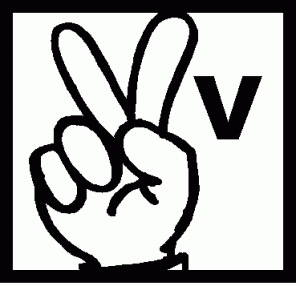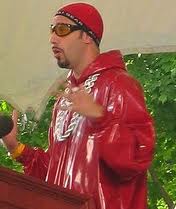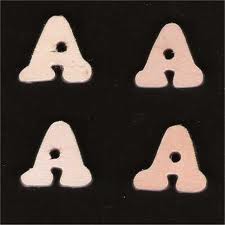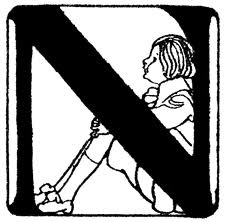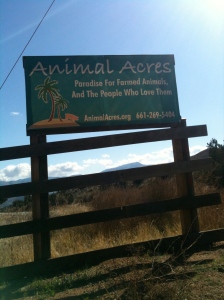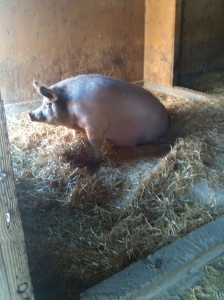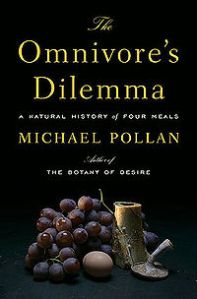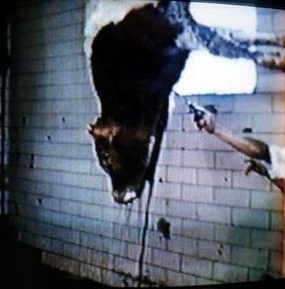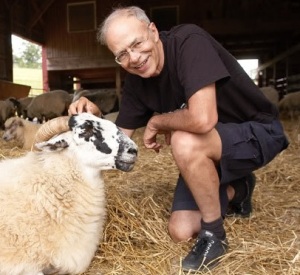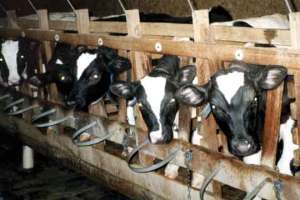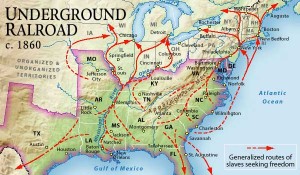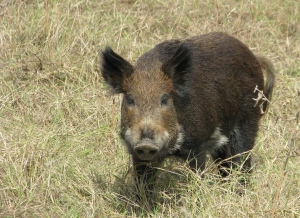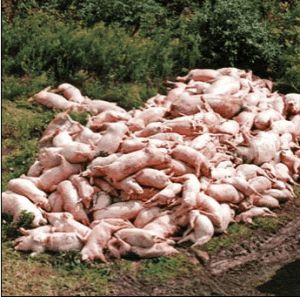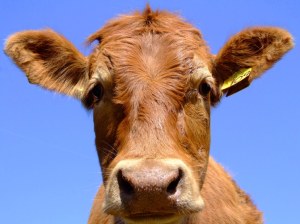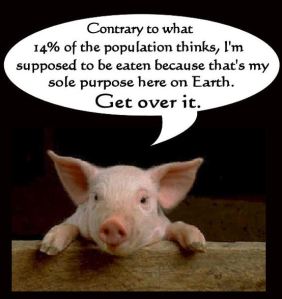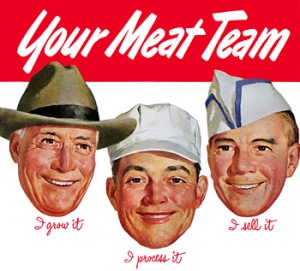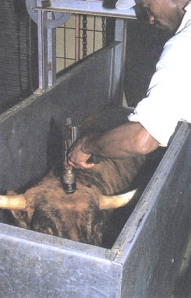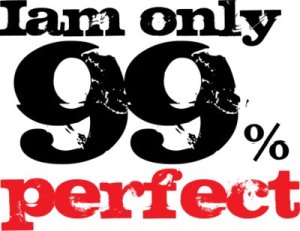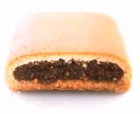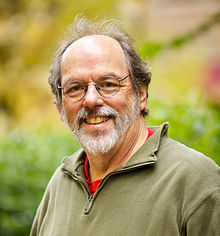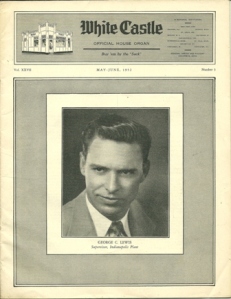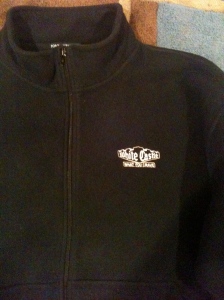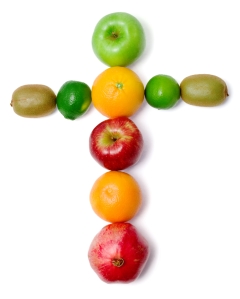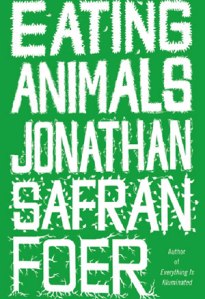Portland is a vegan mecca. Or a city with lots of vegan options. Or a city without all that many options but a vegan mecca anyway.
That is what I learned last weekend.
I can’t believe it’s been a week already since I sat in a giant piece of metal and got off in a place I’d never been before. But that’s more about travelling than veganing so let’s move on.
I went to Vida Vegan Con! And there were hundreds of people, almost all of them vegan, mingling!
Mingling is one of the things that goes on at Vida Vegan Con, and as I learned, or more accurately, was taught, that’s one of the main reasons to come to Vida Vegan Con. To get to know the big (and not as big) VABs (Vegan American Bloggers) — and some un-Americans, I mean non-Americans, too. Another reason to come is for the panels, lectures, seminars, discussion groups and “expert corners.” (An expert corner is where someone with specific knowledge sits at a table and answers questions individually for an hour or so. My main problem with this is that the location wasn’t a corner at all. In fact, it was pretty much a 180° angled space.
Then of course there’s the food. The food at the conference, and the food you go and get in the city itself. And a few food-you-go-and-get-in-the-city-itselfs that were sponsored by the conference.
I’ll start with the good. And in the end I decided the conference was mostly good, and was definitely worth going to. Some iffy panels earlier in the weekend were redeemed by some really good ones later in the weekend. I went to a terrific talk by Jason Das of SuperVegan fame about coding. When it comes to this stuff, I’m code-depenedent on others, so it was good to get a basic understanding. But what Jason could offer, as opposed to some type of basic html class I could find almost anywhere, was the intellectual under-layer of it all. Anybody can tell you what an h1 is. Jason somehow effortlessly managed to weave it all into a social and even sociological context that really got at the underpinnings of how coding greets the robots and the robots run the world. I managed to conceptualize the never-ending jetstream of information that continually blows ’round the Earth in a way I never had before. This was the kind of lecture you’d get at a great university and was worth the admission price of the conference.
I also went to a really good nuts and bolts discussion on social media by VeganMoxie and Vegtastic (aka Dawn Quinn and Helen Pitlick) that did a really good job of spelling out the differences between all the large social media networks. It was interesting to hear it from the inside point of view of people who deal with Google Analytics for a living.
Another great event was a discussion led by Ryan Patey of T.O.F.U. magazine. Now this is one interesting dude. (Can I call a Canadian man “dude” in 2014? Sure I can, cuz I’m old!) Anyway, Ryan managed to make the difficult task of managing an intimate discussion of chatty vegans look easy. And it wasn’t easy. Because one of the things I learned at the vegan con was that some vegans looooooooove the sound of their own vegan voices. Certain panels (not Ryan’s) got hijacked by people who wanted to tell everyone how amazing they were. If anything had come out of their mouths to make me think wow this person is amazing then I probably wouldn’t be typing it. But like in the real world the people who don’t stfu are usually the ones you wish would stfu. Ryan managed to give these people enough speaking time that they didn’t explode like a microwaved Vegg, while letting the people without traumatic childhoods also have their say. And he was thoughtful and considerate and measured and moved the thing along and it made for an enjoyable hour.
I won’t go too much into the panels I didn’t like because, as I said, the good outweighed the bad. But my recommendation for next time would be to come up with a way to keep things on-topic. When it was one person giving a talk, this wasn’t a problem. But on a panel it seemed at times that you were watching a political debate among five or six candidates, where not much debating goes on at all, and the crux of questions are quickly batted aside in favor of me-me-me talking points. (If someone asks how you can reconcile being an ethical vegan and still owning a child-made smartphone, don’t tell us about the new version of your cookbook that’ll be available for Kindle this fall.)
Another one of my recommendations for the organizers would be to find a location with bigger meeting rooms. Don’t get me wrong, the Portland Art Museum was a beautiful space. And there were plenty of big rooms. But it felt like a number of events were “full” meaning that if you hadn’t signed up in advance or hadn’t gotten there early you got shut out. The conference was capped at a certain number of attendees, and at some point a month or two ago it “sold out.” And tickets were $280. My feeling is that if you paid the money and made the effort to travel to the conference, you should have been able to attend whatever events you wanted to. It’s possible I am an ignoramus and that this just can’t be done, but being an ignoramus and not understanding what is and isn’t possible hasn’t stopped me from complaining about things in my real life so I’m going to complain about it in my vegan life, too.
But I think those are small complaints overall.
Some people complained about the lunch line, which stretched all around the main ballroom. That didn’t bother me. It seemed to move fast and it was a chance to talk to people while you waited. And most of the food was deli slicey sponsory provided food so I didn’t see the need to rush anyway. That Tofurky slice wasn’t gettin’ much colder.
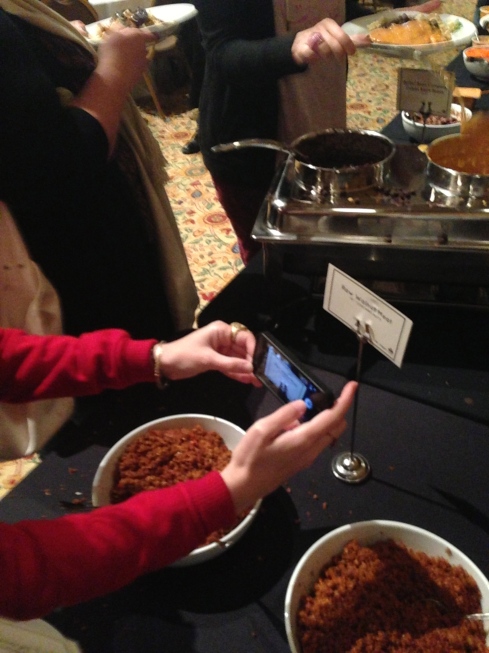
Some people were busy getting lunch while some people were busy photographing Raw Walnut Meat signs that warned it contained nuts.
The only time coldness of food was an issue was at the big breakfast they did on Saturday morning. This seemed like it was going to be a great event. Half a dozen or so of the better-known vegan-friendly restaurants in Portland were coming in to offer up some breakfast foods. But some of them, like Portobello, were very disappointing. I can’t remember the pretentious name of Portobello’s offering, but it was definitely the fanciest name I’ve ever heard for half a baked potato with some pesto drizzled on it. A cold wet potato doesn’t deserve a name that sounds more like some Thelonious Monk opus. (Ha, ha, Portobello, I beat you in the pretentiousness game with my Monk reference.)
And then there was Sizzle Pie, which I’d been really wanting to try. They brought in a few different pizzas for us to sample but the pizzas were all cold! As in, once were hot, were sitting around in boxes not even those insulating bags, and if you know how unappetizing sitting-around pizza can be, then you have an idea of what this was like. Seriously, did the Sizzle Pie owner — who couldn’t have been nicer and told me he’s been thinking about trying to open a location in Los Angeles — think this was a good way to show off his product? He also owns the White Owl Social Club, a bar with vegan options, which was also giving away food right next to Sizzle Pie — hot food, good food — so why couldn’t they have figured out a way to keep the pizza edible?
But again, these are small complaints, and I know the organizers would be disappointed in me if I weren’t somewhat insufferable about their event, so I’m weighing in. But overall they did an impressive job of providing a diverse schedule of events, covering everything from cooking, to photography, to the environment, to fat-shaming, to social media, to publishing, and on and on and on. And things seemed to move smoothly and were interspersed with fun events in the main room like giveaways and gameshows which not only gave people the opportunity to demonstrate their Aspergery knowledge of which recipes were on which page of which cookbook, but more importantly gave attendees a reason to gather in the main room and mingle and get to know one another, and also to meet famous vegans including most of your vegan blogging heroes.
I mean, seriously, I met Isa! And Terry Hope Romero! And JLGoesVegan! And the Fat Gay Vegan! And Ginny Messina MPHRD, and, finally in person, that Das guy, not to mention his fashion bloggin’ partner Jesse Anne O, who forced me to remove my tire-tube belt so she could photograph it for her vegan fashion blog! (Okay, that wasn’t what happened at all. I kinda took off my belt myself in a desperate attempt to demonstrate that at least one item in my three-day vegan weekend wardrobe might, if she were charitable, be worthy of depiction.) But if I knew there’d be vegan fashion bloggers around hell I’da brought my top-notch vegan attire dang why didn’t I?!?!
Okay, movin’ on. The city it self. I’d never been there. And I can’t stomach the show. You know, the -ia one. So it was all new to me. And I liked it. A lot. There are lots of places, even unlikely places, that have vegan options on their menu. So much so that when I came across places that weren’t vegan friendly (c’mon Blue Star donuts — not even one?!, and hey server at Deschutes Brewery, am I really making your life that hard by changing from the brioche bun to the wheat bun for my veggie burger?) it was kinda weird.
I put a bunch of food photos on my Instagram @insufferablevegan, which if you don’t follow then huh what why not?!?! But here’s a brief recap of my non-conference food. Oh wait, there’s some conference food I should mention. I had some Teese nachos at the Chicago Vegan Foods table. Their nachos are good and their peoples are friendly. It’s always a good booth to visit when veganexpoconferencing. And of course I needed more nachos at the Heidi Ho vegan cheesy sauce booth. Heidi’s friendly, too. In fact, I don’t know that I ever met a vegan cheese producer that wasn’t friendly! Have I stumbled onto a topic for an anthropology dissertation?!?! (This is my most ?!?!?!y post yet!) And there’s one more conference sponsor I should mention, Missionary Chocolates, whose name I thought was RX Chocolates until I googled RX Chocolates which brought me to Missionary Chocolates, which had some really tasty chocolate they were sampling and which I meant to buy to bring home but forgot. Dang?!?!
Okay, what else I eat? I got to finally try the Thumbs Up bar from Go Max Go. It was part of the pretty amazing swag bag collection that you get for attending the conference. It’s a fake Butterfinger and I liked it! I didn’t included it in the conference part of the food list because I ate it in my hotel room. Alone. And made crumbs. On the desk. Not the bed. I’m not gross. In that way.
On Friday afternoon I went for a walk with a bunch of people — bunch being the preve-mentioned Jason Das, Terry Hope Romero, Jesse Anne O, and my vegan sherpa Special Needs Eater aka One Woman Groupon aka Andrea something, to Petunia’s Pies and Pastries of Portland, a vegan and gluten free place, and even though I adore gluten I was very happy with the things we ordered and passed around one to another like something that used to be illegal in Colorado.
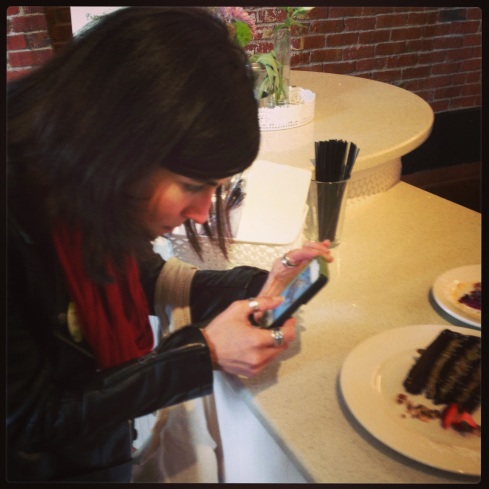
Author Terry Hope Romero photographing the Chocolate Caramel Pistachio Torte at Petunia’s Pies & Pastries in Portland.
Later on Friday night, there were some kind of conference-associated things going on at the famous vegan mini-mall. Speaking of famous, the famous Melisser was nice enough to give us a ride over there. Melisser is a fun person to know. AND she punches people! I tried hard not to be too insufferable.
Here’s my big beef (soy-based) with the mini-mall: It’s not a mini-mall! Okay, you got that Portland?, city that turns parking lots into food cart emporiums, you do a lot of things great but stop calling a few adjacent stores that open onto the sidewalk and don’t have a parking lot in front of them a mini-mall! You know what these are? THESE ARE STORES! These are four vegan stores next to each other. CALL IT THAT. It works for Five Guys. Just be honest!
Okay, I’m glad Melisser doesn’t own the vegan mini-mall. Or I’d be holding a piece of tofu to my eye. Anyway, the “mall” (picture those quotation marks in 96-point type) consists of Sweatpea Baking Company, Herbivore, Food Fight, and a vegan tattoo parlor (which I guess means the inks aren’t squid). Chicago Vegan Foods (yah, the Teese folk) were giving away s’m’o’r’e’s inside Herbivore, and the Upton’s Naturals folk were selling delicious gorditas in the back of Food Fight! (That exclamation point is part of Food Fight!’s name, although the gorditas were good enough to warrant one.) I also, because I’m a pig (and there was probably a seminar on why you shouldn’t use the word “pig” because it’s both fat-shaming and insulting to animals and a trigger word) went into Sweetpea’s and got their signature item, the Charlie Brown, some kind of peanut-buttery brownie with a hard chocolate coating that was, I’m not gonna lie, crazy good. I shared it around. Seriously, like 46 people had bites of my brownie (that’s not a metaphor!) and it reached the point where people I didn’t even know, hadn’t met, and might not have even had anything to do with the conference, were taking bites of my brownie. Is that a Portland thing? Is it a conference thing? Is it a thing that happens when multiple vegans gather up? I don’t know!
So of course this was all the appetizer for the Friday night main dinner, which I believe Mr. Das came up with, which was to trek to the Sweet Hereafter for dinner and drinks. And a trek it was. A good city-exploring trek of Portland. Now like I said, I’d never been to Portland before, and it turned out to be a good walking city. Here’s my impression of Portland: (impression as in, here’s my Joe Biden impression, not as in, what I thoughted about it) Okay, here goes: interesting houses with porches, more interesting houses with porches, little strip of commerce with a grocery store, a laundromat, a restaurant and a bar, more interesting houses with porches, lots more interesting houses with porches, another commercial strip. Repeat like a three hour long six second Vine video.
Most of the walk I spent talking to Carlo Giardina of The Food Duo, a vegan from NY/NJ (actually it was NJ/NY I think). Carlo’s a really good guy who was attending Vida Vegan Con with his better duo half Carmella, and they both were friendly and interesting (as opposed to me, the kind of person who calls people friendly and interesting). I got to hear Carlo’s vegan origins and since we both grew up in the New York area, we had plenty to talk about. Which was good because, did I mention, it was a nine hour walk. I’m not complaining, mind you. I like walking. And I even brought my best vegan walking sneakers (which Jesse didn’t photograph) but they were no match for this walk.
At the end of this walk (did I mention it was long) we reached the Sweet Hereafter. (So named, apparently, because most people die on the walk there.) And the Sweet Hereafter was packed. Absolutely packed. We were lucky to get a table. It was full of people drinking booze and whatever space wasn’t taken up with people drinking booze was filled with loud music that I guess was ironic (uh, Kokomo in 2013 when it wasn’t even good in 1988 — gulp one-fourth of a century ago — and I like the Beach Boys but nobody needs to listen to that song again and didn’t need to way back then either) and so we were lucky to get a table when the people right where we were standing got up and I looked at the menu and turned to Mr. Jason Das and said something like I assume the menu here is vegan-friendly and he said it’s all vegan that’s why we came here and what?!?!
Seriously, this bar, packed with young human adults and bad loud music, like every annoying bar you ever went to in your life, was all vegan! I ain’t never seen nothing like that in my life. STG. We have a bar in L.A. called Mohawk Bend, that’s got a good half the menu which is vegan. And another bar by the same owner called Tony’s Darts Away that has vegan options and great vegan specials. And yet another place Golden Road Brewpub owned by the same vegany owner Tony Yanow where vegans can drink and eat to their Follow Your Heart’s content. But an all-vegan bar with an all-vegan menu and probably packed full of folks that are 90 percent non-vegan peoples? This was new to me. The future of the world. And why don’t we have this here?
And… (here comes a big and) the food was great! I had a Buffalo soy curls sandwich that was delicious. And we got some kind of jerk tofu sandwich that was really good. And their báhn mì (sorry, no báhn mì is ever gonna top Mandoline Grill) was really good, too. And I’d have taken photos but my phone died and Special Needsy very pointedly would not take a photo for me with her phonecam. (That’s okay, that’s my only Special Needsy complaint of the weekend, and I got the better of that deal since I annoyed the crap out of her especially the day when I only got two hours sleep the night before and went on and on and on about every little thing and not only annoyed Needsy but also annoyed about two hundred and forty two vegans that I was meeting for the very first time and didn’t know what to make of me because they never saw someone so caffeinated even though I didn’t have any caffeine and they mostly stayed away from me which was pretty smart or I surely would have driven them completely crazy too.) Long story short (you see, because that’s impossible now) there are no photos of the best meal I had in Portland. That’s okay, it’s not like *I’m* the one who has to live with that guilt for the rest of their life.
Where was I? Oh yeah, Kokomo. So the next day was the breakfast event I already told you about and then there was a lunch I already told you about and oh, I know, in the morning I walked to Voodoo Doughnut to get some vegan doughnuts because I love vegan food and I love that there’s still one place left in America that spells doughnuts the rite way but when I got there at 7:30 a.m. and opened the door there was a line inside and I was supposed to meet people at the art museum at 8 a.m. for the breakfast so after waiting on the line for five minutes and seeing that it barely moved and that there was only one person working the counter I decided to leave doughnutless and head back to my hotel and to breakfast.
Which leads me to dinner. For dinner we went to — oh wait, there was some before dinner dining! Almost forgot. We went to Salt & Straw, a non-vegan ice cream place that has no vegan ice cream but does always apparently have two kinds of sorbet that are vegan. This time they were black currant, and dandelion with edible spring flowers. The black currant one was delicious and the other one had dandelions and edible spring flowers in it. I’m pretty sure that dandelions are weeds and that edible spring flowers are flowers and that neither one of those qualifies as vegetables but if I knew anything about anyone ever it was that for these purposes weeds and flowers were going to count as vegetables as far as someone-I-know’s no vegetable dessert rule and since sorbet is clearly dessert I was right and said person did not like flowerweedvegetables in their sorbet. Lord, some people are picky!
One of the things that made going to Salt & Straw perfect was that it was only a two hour walk from the place we wanted to go next — Homegrown Smoker. I had heard of Homegrown Smoker shortly after going vegan more than two and a half years ago. And of all the vegan places in the Untied States of America that I really really really wanted to try Homegrown Smoker might have been at the very very very top of my list. And luckily, the other people in our group, which at this point was me, Needsy, Jesse and Needsy’s incredibly tolerant, patient and very funny omnivore, seemed interested in trying it, too. And by the way, if you are going to go to a vegan conference, and want to have fun and experience humor when you eat food in the city the conference is located in, you could not pick three funnier people to go have dinner with than the people I had dinner with. I just sat there eating my food thinking wow, these people are (insert curse word) funny!
But wait, I almost forgot, on the walk to Homegrown Smoker, we passed the Bye and Bye, another vegan bar owned by The Sweet Hereafter people. And some of us needed a bathroom break. So we entered. And of course, since I’m Mr. Checklist, I wanted to have a beer and some food, so I could say that sure I’ve drank and eaten at the Bye and Bye, and when I came out of the bathroom to find that Jesse had ordered some Brussels sprouts, well, it just ramped up my already high opinion of said vegan fashion blogger. And so I ordered a beer, because like I said, I’m Mr. Checklist. But don’t worry, it’s not like that’s an OCD thing of mine or anything (sorry if I’m OCD-shaming here) and it’s not like I had to run into Powell’s Books on my walk around downtown, even though we were rushing back to catch our ride to the airport, and run up to a bookshelf to touch a single book to be able to say that I’ve been to Powell’s City of Books and looked at books there (and the book that I randomly first encountered on my touchsprint was Michael Pollan’s new Cooked book how weird is that?) but yes I really did do that what’s wrong with me?!?!?!
Where was I? Oh yeah. Belgium. Well the Brussells sprouts were good though I didn’t drink them with a Belgian beer because that is probably my least favorite style even though I like every other style of beer (what’s wrong with me?!?!, okay I really don’t love Scottish malts either) and then we continued on with our walk which included a jog in the road and then we reached HOMEGROWN SMOKER!!!!
Homegrown Smoker is a food cart in a parking lot and I’m not even going to bother trying to explain this concept to you if you haven’t been to Portland but suffice it to say that the official nickname of the city is City of Bridges and Parking Lots with Food Carts in Them. And in that parking lot, AND IN THAT CART, is a man who at first I said was Ed Begley but upon further thought was clearly Phil Lesh and who takes vegan meats such as seitan and soy curls AND SMOKES THEM. If you’re reading this, Phil, I was the douche who asked you if you’re able to get a smoke ring on the fake meats and it really was a serious question and I appreciate you seriously answering me that no it’s impossible because it has to do with the enzymes in the animal tissue or whatever right-sounding explanation you gave me.
Either way, I was so crazy excited to be there that I even ordered two things which I only do maybe 40 percent of the time I dine out and this time I got a Beyond Meat sandwich and a reuben sandwich and the Beyond Meat sandwich was particularly good and I don’t need to tell you about my history with Beyond Meat if you’re a regular reader of my weblog.
I don’t think there was any more food that night, only a thirty mile walk back to the hotel, though there was some talk of doughnut purchasing around Mile 29, but since everyone was too tired to chew, the plan was quickly abandoned. Which of course meant I had to get up the next morning and go back to Voodoo yet again. (See Mr. Checklist reference above.)
This time, as I approached, around 8:30 a.m., I could see a line down the side of the building. And as I got closer I could see it was a double line, meaning it was twice as many people as I thought it was a moment earlier. Oh, what an idiot I was for not waiting it out the day before! Well, I couldn’t give up now. So I headed for the line. And as I reached the store I noticed something. There was no line *inside* today! And there wasn’t just one person working — there were two, maybe even three! So I got on line and used the time to instagram my Homegrown Smoker photos from the night before since my phone had died again that night. (It seemed like my phone battery drained much faster in Portland than L.A., even factoring in that I was probably using it way more.)
Anyway, I got to the front and then it was my turn. There’s a lot of pressure. You want to get the right thing. Everybody has told you about Voodoo and everyone has a different favorite thing and you can’t get 300 doughnuts so I got the four that looked the most interesting. And then, as I walked back to the hotel holding my pink box and trying a bite of each doughnut, it struck me that looks are really what Voodoo is about. It’s not like Needsy hadn’t warned me; she told me they looked a lot better than they tasted. And she was right. Four doughnuts, four bites of mediocrity. Even with the warning, I was very, very disappointed. I’d say even BabycakesNYCLA‘s doughnuts are better, and that’s not saying much.
So that’s my weekend in Portland. Lunch on Sunday was another one of those sponsored affairs at the museum, and dinner was the one I already told you about at Deschutes, and I already told you that the Sunday events were my favorites, and I already told you about all the great people I met, and I already wasted way more of your time than I should have and that you should have.
So I’ll see you at VVC3? In Chicago or wherever? In August 2014 or whenever? And I’ll bring more comfortable shoes.

